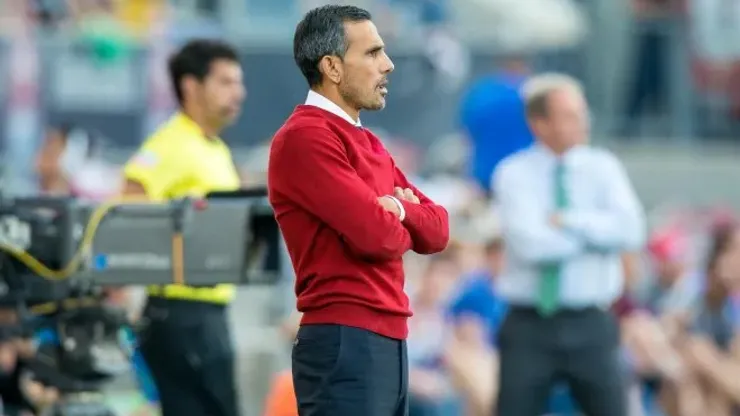Pablo Mastoreni didn’t set out to be a manager.
It was the winter of 2013. FC Dallas was looking for a coach, and the then-Colorado Rapids manager Oscar Pareja — who had spent fourteen years in Dallas before moving to Colorado — wanted the job.
The interest was mutual. Pareja was a rising star in the MLS coaching ranks, known already for his player development skills and ability to mold young teams. Dallas was a young team, and Pareja wanted to come home. It was a perfect fit.
But with Pareja still under contract in Colorado, the Rapids fought the move tooth and nail. The saga dragged into the new year until Pareja finally was allowed to resign and sign with Dallas in exchange for the Rapids receiving Dallas’ first round draft pick and allocation money.
Enter Mastroeni. The Rapids legend had just retired after playing the 2013 season with the LA Galaxy, and was planning on rejoining Colorado in some capacity for the 2014 season. When Pareja left, with his club in a pinch, Mastroeni was made interim manager.
Mastroeni’s coaching career should have ended there. But the Rapids took no serious steps towards hiring a permanent manager in the following two months, and in March — with the season a week away — Mastroeni was thrown into the deep end.
With zero coaching experience, five months after the end of his playing career, he was named the permanent coach.
It was, predictably, a disaster. Mastroeni inherited a playoff team full of promising young players, but by the end of his first season in charge, the roster was a mess and the Rapids had finished next-to-last in the Western Conference.
2015 was even worse. Colorado finished bottom of the Western Conference, winning just nine times all year and scoring less than a goal per game. The soccer was unwatchable, the team was irrelevant, and there appeared to be no coherent vision for its future.
Mastroeni plainly had no idea what he was doing. Many of the players emerging under Pareja — Dillon Powers, Chris Klute, Clint Irwin, DeShorn Brown — were either benched or shipped out and replaced with journeymen veterans like Kevin Doyle and Sean St. Ledger.
And if that wasn’t bad enough, the Rapids were playing the most regressive soccer in the league — regularly, even at home, sitting ten players behind the ball and breaking out only sporadically.
But instead of parting ways with Mastroeni after 2015, the Rapids doubled down on him. To help the offense, they brought on former Portland Timbers manager John Spencer — that paragon of beautiful attacking soccer — as an assistant coach, and started splashing the cash.
2016 was a charmed year. Behind a phenomenal defense — bolstered midyear by the addition of Tim Howard — the Rapids finished second in the Western Conference and came within a game of MLS Cup.
The run bought Mastroeni time. But it didn’t do much more than that. The Rapids were still playing ugly soccer, they were still the second-lowest scoring team in the league, and they’d gone a crazy 13-4 in one-goal games.
The success wasn’t sustainable, and, sure enough, the Rapids have come crashing back down to earth this season. With twelve games to play, they’re tenth in the West with the second-worst offense in the league.
In May, the Rapids traded two of their most reliable players, Sam Cronin and Marc Burch, to Minnesota United for squad players Josh Gatt and Mohammad Saied in some sort of a bizarre, roundabout effort to “change their style of play.”
Like most everything Mastroeni has done since he took over three-and-a-half years ago, it made zero sense.
Fittingly, Mastroeni’s most notable moment of this season came in the form of an epic rant against analytics after his team beat Sporting Kansas City at the end of May, a rant that ended with the line, “stats will lose to the human spirit every time.”
SEE MORE: Schedule of MLS games on US TV and streaming
It was vintage Pablo: fiery, stubborn, and deeply felt. Those traits made him a great player, and they unquestionably rubbed off on his team last season. But while heart can certainly help you win soccer games, it isn’t a replacement for talent or sound direction.
Mastroeni has been and may be again a great servant to the Colorado Rapids. He poured everything he had into his job. But after almost four years, the club ran out of patience with being a laughingstock.
Mastroeni can’t say he wasn’t given ample time to build a winner. In fact, he was probably given far too much time. The fact that he was hired in the first place says plenty about a franchise that has been one of MLS’ worst-run in this decade.
Colorado can increase their footprint in Denver and bring better crowds out to their suburb. They can revitalize their franchise. It just wasn’t going to happen under Mastroeni — and while it took almost four years, the Rapids finally came to the same conclusion.
200+ Channels With Sports & News
- Starting price: $33/mo. for fubo Latino Package
- Watch Premier League, Women’s World Cup, Euro 2024 & Gold Cup
The New Home of MLS
- Price: $14.99/mo. for MLS Season Pass
- Watch every MLS game including playoffs & Leagues Cup
Many Sports & ESPN Originals
- Price: $10.99/mo. (or get ESPN+, Hulu & Disney+ for $14.99/mo.)
- Features Bundesliga, LaLiga, Championship, & FA Cup
2,000+ soccer games per year
- Price: $5.99/mo
- Features Champions League, Serie A, Europa League & Brasileirāo
175 Premier League Games & PL TV
- Starting price: $5.99/mo. for Peacock Premium
- Watch 175 exclusive EPL games per season






